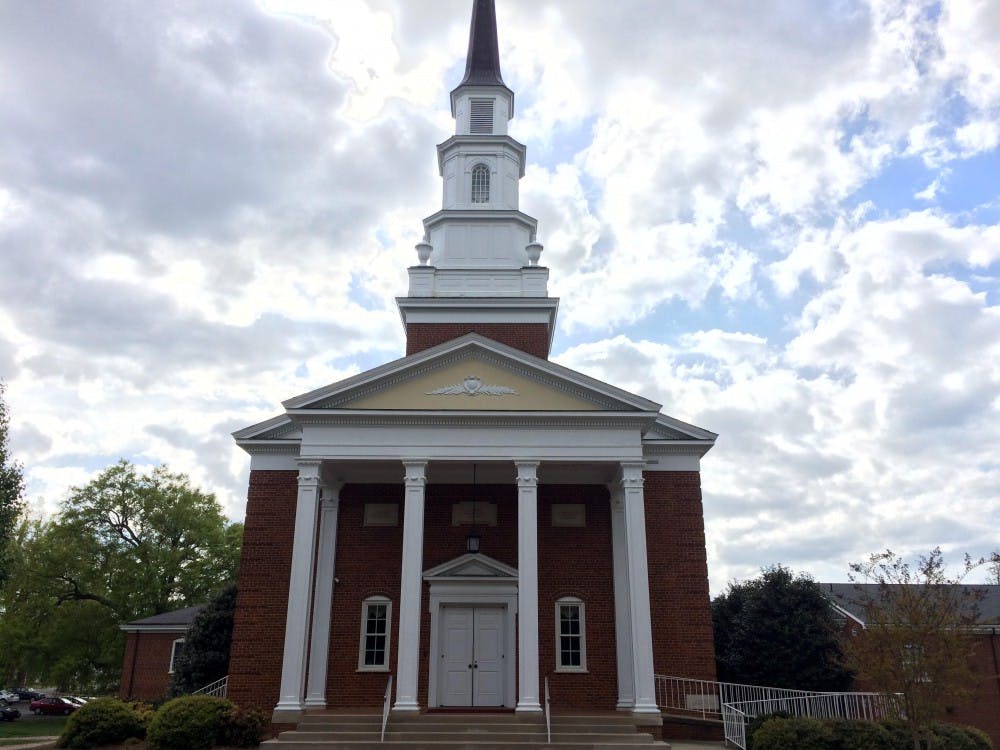In 1889, Elon College planted its roots just like most of the other esteemed colleges at the time: through the initiative of a church.
The Southern Christian Conference chartered Elon College in order to better educate individuals for the Christian ministry. Elon’s progression to its current status of no official affiliation with any religion demonstrates a great change in the university’s goals since it was founded.
The Southern Christian Church eventually united with the Northern Christian Church to form the General Convention of the Christian Church in 1890. In 1931, this church body merged with the Congregational Church of England to form the Congregational Christian Churches. Finally, in 1957, the United Church of Christ (UCC) formed from the merger of the Congregational Christian Churches and the Evangelical and Reform Church.
Elon’s university historian, Dr. George Troxler, conducted extensive research on Elon’s history for his book “From a Grove of Oaks: The Story of Elon University.” He stressed that Elon’s founding was not much different than to the other colleges that were founded with religious ties. He said the prevalence of the church’s affiliation is decreasing over the past 127 years.
On page 118 of Troxler’s book, he noted that there was no requirement by 1956 for members of the Board of Trustees to be members of their affiliated church as they had been previously. Required Chapel was also eliminated in 1968.
After hearing the statistic from the Spring 2016 Registrar Report that 48 undergraduate students identify as members of the UCC, Troxler was surprised to hear such a low number. He referred to the fact that many students are second-generation Elon students and grow up with the religious background of their parents.
“Christianity is such a self-perpetuating religion that leads people to follow in the same footsteps as the people they know about and grow up with,” Troxler said.
Ultimately, Troxler sees the influence of Elon’s past religious affiliation through its embracement of various religions and cultures.
“We have a deeply religious culture, but we welcome all faiths,” Troxler said. “Our respect for different faiths comes from a long tradition of being affiliated with a Christian church.”
Though he admitted he didn’t know much about the UCC’s history at Elon, Associate Chaplain of Protestant Life Joel Harter agreed that Elon’s previous religious affiliation is evident.
“The impact today on Elon’s culture is more subtle and less apparent, mostly in shared values for diversity, inclusive community and making a positive difference in the world,” Harter said.
The Elon Community Church, which aligns with the UCC, is celebrating its 125th anniversary from the time that Reverend and President Long officially chartered the Church. Dr. Earl Danieley was the first university president who didn’t also serve as the Elon Community Church’s head pastor. Today, this church caters more to the local community residents, and only 5-10 Elon students usually attend their weekly service.
Despite its low attendance rate of about 150 regular members, the Elon Community Church remains highly involved with Elon’s campus population, according to Senior Pastor Randy Orwig. He said the church’s goal is to promote diverse theological viewpoints and withhold judgment.
“We’re always trying to find ways to reach out, make [the church] a home and safe,” Orwig said. “We’re open and affirming no matter who anyone is, based on religion, race or sexual orientation.”
This church holds various events throughout the year, including weekly farmers markets, Cub Scouts and Boy Scouts meetings, free food samplings for students, fundraisers for organizations on campus and Catholic masses. Orwig and Harter both highlighted the Moravian Love Festival in December and the Winterfaith luncheons during Winter Term, which are co-sponsored by the Truitt Center for Religious and Spiritual Life.
“The seal of the UCC shows that we all may be one,” Orwig said. “We are redefining what ‘oneness’ means and are becoming a harmony of great diversity.”
Orwig did not find the low number of UCC students today at Elon to be either shocking or a problem. To many of the religious leaders at Elon, the lack of university affiliation does not debilitate Elon from having reputable religious events and welcoming all faiths. As long as Elon’s historical ties with the UCC are represented by showing no judgment and embracing all members of the Elon community, the fact that only 0.8 percent of undergraduate students are UCC members is insignificant, they said.


